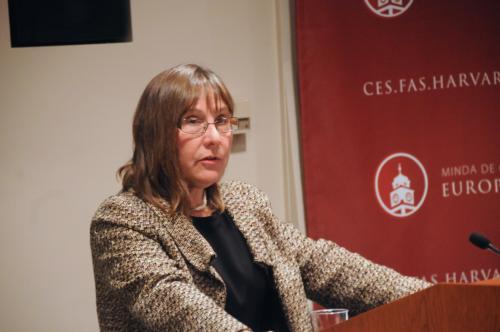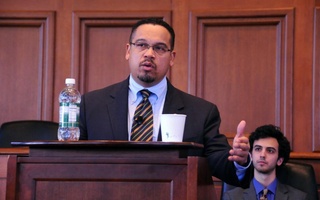
Professor Louise Cainkar gave a speech yesterday at the Center for European Studies, discussing her new publication “Homeland Insecurity” about the Muslim-American experience after 9/11.
Professor Louise Cainkar led a talk yesterday on her new work “Homeland Insecurity: The Arab-American Experience after 9/11” as part of a series of “Islam in the West” seminars organized by the Center for Middle Eastern Studies here at Harvard.
This effort is one of the reasons that led the Center for Middle Eastern Studies to expand and build an interdisciplinary study of the Muslim culture, said Jocelyne Cesari, director of the Islam in the West Institute, a part of the Center. Harvard students and other affiliates have been involved in research and graduate study workshops in the organization’s attempt to assist a contemporary wave of thinking about Islamic culture.
The event consisted of two sections: a presentation about the content of Cainkar’s book and a discussion with the audience.
The presentation provided analysis and evaluation based on Cainkar’s book—“the first in-depth post 9/11 survey,” according to Cesari. Cainkar spoke on her methodology, having interviewed 102 Muslims in the suburban and metropolitan Chicago area after the incident as part of her research.
According to Cainkar’s findings, “the anti-Muslim social climate had been there” since before 9/11, with the attacks just providing an open forum for the “defensive hate crimes.” She evaluates the different responses from the Muslim community, whether through increasing religiosity, strengthening of bonds between different Muslim communities or segregating from non-citizens.
The growth in “non-quantifiable hate crimes” has, however, affected the environment for the better in that it brought this racial issue to center stage, Cainkar said, adding that this is essential to ease the way of the process of integration.
Some attendees were skeptical of Cainkar’s findings.
“It was based on self-selecting statistics, exclusive of FBI’s studies”, said Phillip Davis, a non-Harvard affiliate, who expressed his disagreement with Professor’s treatment of the government’s involvement in dealing with the tense environment of 9/11.
Michael McCarrick, an intern at the Harvard Kennedy School’s Carr Center for Human Rights Policy, disagreed. “She presented a lot of interesting, in-depth data. I was surprised at some of the results”, he said.
But Cainkar cautioned that much still needs to be done to resolve the racial issue.
“The sad thing is, though, we have not learned a thing”, Cainkar said. “We keep making the same mistakes.”
Read more in News
Marathon Racers Run for CharityRecommended Articles
-
POSTCARD: To the Anti-Burqa Taxi DriverIt seems as though it isn’t the “subjugation” of these burqa-wearing women that you really care about—it’s their difference, their “otherness.”
-
‘Green Sheikh’ Speaks at HarvardKnown fondly as “the Green Sheikh,” Sheikh Abdul Aziz bin Ali Al Nuaimi of the United Arab Emirates discussed environmental sustainability in the UAE in a presentation hosted by the Center for Middle Eastern Studies.
-
LETTER: The Compassion of All ReligionsLet us stop illogical generalizations in a place that cherishes "veritas."
-
Breakfast in AmericaOver bagels and pastries earlier this month, President Barack H. Obama finally convinced this country that he is not a ...
-
Down With the KingWhile you’re trekking through the Yard this morning to celebrate Housing Day, the House Committee on Homeland Security will be ...
-
 Ellison Demands 'Justice for All'
Ellison Demands 'Justice for All'













